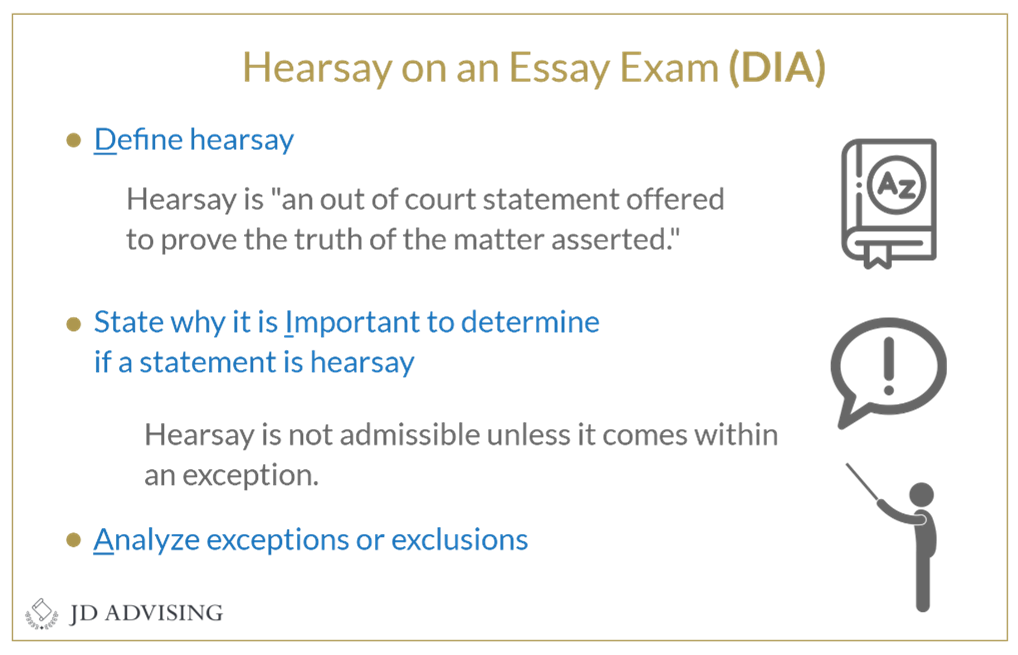How To Learn Hearsay For The Bar Exam
How To Learn Hearsay For The Bar Exam
How To Learn Hearsay For The Bar Exam: Hearsay can be one of the more challenging topics within Evidence simply because there are so many rules to remember! In this post, we give you some study tips to lock down hearsay for the bar exam.
How To Learn Hearsay For The Bar Exam
1. Understand the rationale for the rules.
Start with the general rule: hearsay is an out of court statement offered for the truth of the matter asserted. Hearsay is inadmissible unless an exception or exclusion applies.
Why are these statements generally inadmissible? They are presumed to be unreliable. Perhaps the declarant misremembers exactly what he said. Or maybe he is simply lying about what he previously said. Or maybe the person testifying at trial about someone else’s statement misheard or misremembers the statement. Because of the risk that the prior statement is unreliable, the general rule bars these statements!
However, there are situations where hearsay is nonetheless admitted. The reason for the exclusions/exceptions is generally because the statement has less risk of being unreliable due to the surrounding circumstances. For instance, if someone is dying and makes a statement regarding the cause or circumstances of their death, they don’t have much incentive to lie, so this statement, although hearsay, may be admissible under the dying declaration exception. Try to think about the circumstances surrounding the statement and whether those circumstances tend to make the statement more reliable. If they do, the statement might come in under an exception or exclusion!
2. Group them into three categories.
If you memorize by grouping rules into categories, it may be helpful to group the hearsay exclusions and exceptions into categories.
There are three categories of hearsay exclusions and exceptions: (1) nonhearsay (the exclusions); (2) exceptions that are only applicable if the declarant is unavailable; and (3) exceptions where the declarant can be available or unavailable. Try to remember which rules fall into each category.
You might find it helpful to remember how many exclusions/exceptions fall into each category, and then, once you remember the number, it will be easier to identify all of the exclusions/exceptions. Or, perhaps you are a visual learner: try making a poster with lists of the exclusions/exceptions and look at it every day to help you visualize which exclusions/exceptions fall into each category. Or create a mnemonic for each category to help you remember all of the exclusions/exceptions within it! If you create a mnemonic that is personal to you, you may be more likely to remember it than a mnemonic created by someone else!
3. Memorize the elements of each exclusion or exception.
It is not enough to just know the names of each exception! For instance, “dying declaration” does not apply every time someone who is dying makes a statement! Rather, all four elements must be met: (1) declarant is unavailable (but he doesn’t have to die!); (2) the statement was made while he believed death was impending; (3) the statement concerns the cause or circumstances of death; and (4) it is used in a homicide or civil case. Often, in the fact patterns of MBE questions, one of these elements is missing, so the dying declaration exception is not applicable! It is very important to memorize each and every element of each exclusion or exception to make sure you are applying the exclusions and exceptions correctly.
Memorizing the elements will also help you see the differences between the exclusions/exceptions that otherwise sound very similar! For instance, prior statement of a trial witness and former testimony sound like they could apply in extremely similar circumstances! The prior statement of a trial witness exclusion only applies when the trial witness is actually testifying at trial. The prior testimony exception when the declarant is now unavailable. Make sure you pay attention to all of the elements of each exclusion/exception to ensure that you are applying the correct one!

4. Make color-coded flashcards.
While we do not recommend that you make flashcards for every subject on the bar exam, hearsay flashcards may be helpful! Try using colored flashcards and use a different color for each category of exclusions/exceptions! Be sure to include all the elements of each exclusion/exception on your flash card, and you can even add examples! Which takes us to the next tip . . .
5. Create examples for each hearsay exclusion or exception.
Do you find that you remember the examples better than the rules? Come up with your own examples for each hearsay exclusion/exception! Or, as you go through practice questions and encounter different examples, jot them down next to the exclusion or exception they fall under!
For example, for dying declarations, you can include the following:
Suffering from stab wounds, Joe is at the hospital on his deathbed. He whispers to the nurse, “It was Bob.” Joe dies and Bob is charged with murder. Joe’s statement can be admitted at Bob’s trial as a dying declaration.
6. Spend time doing things other than practice questions.
Be sure to spend some time memorizing hearsay for the bar exam in whichever way works best for you. What generally does not work is simply doing hundreds of practice questions without learning and memorizing the material first. If you find that you are getting practice questions wrong, the solution is not to do more practice questions, but to go back to the material and make sure you understand and memorize it!
Looking to Pass the Bar Exam?
Free Resources:
- 🌟Bar Exam Free Resource Center: Access our most popular free guides, webinars, and resources to set you on the path to success.
- Free Bar Exam Guides: Expert advice on the MBE, the MEE, passing strategies, and overcoming failure.
- Free Webinars: Get insight from top bar exam experts to ace your preparation.
Paid Resources:
- 🏆One-Sheets: Our most popular product! Master the Bar Exam with these five-star rated essentials.
- Bar Exam Outlines: Our comprehensive and condensed bar exam outlines present key information in an organized, easy-to-digest layout.
- Exclusive Mastery Classes: Dive deep into highly tested areas of the MBE, MEE, MPT, and CA bar exams in these live, one-time events.
- Specialized Private Tutoring: With years of experience under our belt, our experts provide personalized guidance to ensure you excel.
- Bar Exam Courses: On Demand and Premium options tailored to your needs.
- Bar Exam Crash Course + Mini Outlines: A great review of the topics you need to know!
🔥 NEW! Check out our Repeat Taker Bar Exam Course and our new premier Guarantee Pass Program!






Leave a Reply
Want to join the discussion?Feel free to contribute!